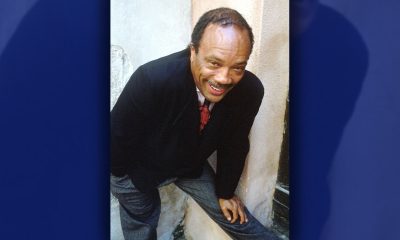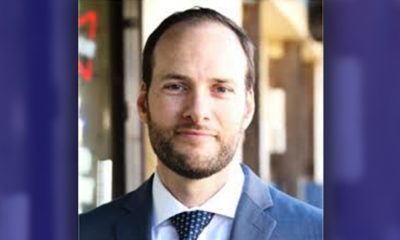Entertainment
Q&A: John Legend on Race, Common, Sam Smith, ‘Blurred Lines’

John Legend poses for a photograph during the SXSW Music Festival on Saturday, March 21, 2015 in Austin, Texas. (Photo by Jack Plunkett/Invision/AP)
Mesfin Fekadu, ASSOCIATED PRESS
AUSTIN, Texas (AP) — John Legend says he’s concerned that the “Blurred Lines” verdict could set a scary precedent for artists creating music inspired by others.
In a wide-ranging interview with The Associated Press, the Grammy winner said understands why people say 2013’s biggest hit song by Pharrell Williams and Robin Thicke sounds like “Got to Give It Up,” Marvin Gaye’s 1977 hit, adding: “I said that when I first heard it, too.”
But he said he doesn’t agree with the jury that determined the performers copied elements of Gaye’s work.
“You have to be careful when it comes to copyrights, whether just sounding like or feeling like something is enough to say you violated their copyrights,” the singer-songwriter told The Associated Press on Saturday before performing at the South by Southwest music festival. “Because there’s a lot of music out there, and there’s a lot of things that feel like other things that are influenced by other things. And you don’t want to get into that thing where all of us are suing each other all the time because this and that song feels like another song.”
Williams, with whom Legend has worked in the past, and Thicke also were ordered to pay nearly $7.4 million to three of Gaye’s children.
“I think we have to be careful about that, and I’m a little concerned that this verdict might be a slippery slope,” Legend said.
Legend also spoke about collaborating with Sam Smith, whose debut album earned him Grammys for song and record of the year last month; his collaborator Common’s recent comments about racism that sparked some backlash; and mentoring budding artists with for the AXE White Label.
Here are some highlights from the interview:
___
AP: Are you working on a new album?
Legend: A week from Monday I’ll start. I’m going on vacation next week because I need it (laughs) and then I’ll really jump in the studio to start writing again.
AP: “All of Me” was such a huge hit. Is there any pressure as you head into the next album?
Legend: The pressure I put on myself isn’t, ‘I have to make another ‘All of Me.” It’s just I have to write great songs. I want to make a better record than I made the last time. I want to grow. I want to discover new things about myself creatively.
AP: You and Common won an Oscar for “Glory” from (the movie) “Selma.” Where did you put it?
Legend: It’s sitting on my piano in New York at our apartment there.
AP: Common received some backlash for his comments about ending racism on “The Daily Show” last week. What are your thoughts?
Legend: Oh yeah, I heard a little bit about it and I understand what he’s saying because I do believe that part of us ending racism is us seeing each other’s humanity and learning to love each other, even if we look different or worship differently or live differently. But I think it’s not enough for us to extend the hand of love. I think it’s important that that goes both ways. It’s important also that we look at policies we need to change as well.
It’s important for us also to fight for certain changes that need to happen. And one of those issues that I really care about is education. But also another one is incarceration, which is what I talked about at the Oscars. And mass incarceration is a policy that’s kind of built up over the last four decades and it’s destroyed families and communities, and something we need to change. And it’s fallen disproportionally on black and brown communities, especially black communities, and it’s kind of a manifestation of structural racism. So when you think about that kind of thing, it’s not enough to say we need to love each other, you have to go behind that and say we need to change these policies, we need to fight, we need to protest, we need to agitate for change.
AP: What was it like working with Sam Smith on the charity single “Lay Me Down”?
Legend: It was great. I love Sam. I think he’s one of the most talented new artists out right now, and our voices work really well together. And we both love soul music and wanted to make a really powerful song together, and we were able to do that — and do it for a great cause. And I’m excited for all the traction the song has gotten; it hit No. 1, my first No. 1 in the U.K.
AP: Have you been to SXSW before?
Legend: I’ve performed here many times, just different types of events. There’s always something going on. The first time I played here was actually for Starbucks, outside of Starbucks in 2005 for my first album. I’ve come back for different purposes different years. I’ve done a show with Kanye here.
AP: What was it like mentoring budding musicians?
Legend: I love it. It’s something I’ve always done anyway. A lot of it has been informal; some of it is me signing artists like Estelle or executive producing artists like Stacy Barthe. It’s always been a part of what I like to do, and I benefited from it as well. Kanye signed me and has mentored me, Stevie Wonder has mentored me. All kinds of people have given me great advice over the years, so I like to pay it forward as well.
___
Online: http://www.johnlegend.com/us/
http://sxsw.com/
Copyright 2015 The Associated Press. All rights reserved. This material may not be published, broadcast, rewritten or redistributed.
###
Activism
OP-ED: AB 1349 Puts Corporate Power Over Community
Since Ticketmaster and Live Nation merged in 2010, ticket prices have jumped more than 150 percent. Activities that once fit a family’s budget now take significant disposable income that most working families simply don’t have. The problem is compounded by a system that has tilted access toward the wealthy and white-collar workers. If you have a fancy credit card, you get “presale access,” and if you work in an office instead of a warehouse, you might be able to wait in an online queue to buy a ticket. Access now means privilege.

By Bishop Joseph Simmons, Senior Pastor, Greater St. Paul Baptist Church, Oakland
As a pastor, I believe in the power that a sense of community can have on improving people’s lives. Live events are one of the few places where people from different backgrounds and ages can share the same space and experience – where construction workers sit next to lawyers at a concert, and teenagers enjoy a basketball game with their grandparents. Yet, over the past decade, I’ve witnessed these experiences – the concerts, games, and cultural events where we gather – become increasingly unaffordable, and it is a shame.
These moments of connection matter as they form part of the fabric that holds communities together. But that fabric is fraying because of Ticketmaster/Live Nation’s unchecked control over access to live events. Unfortunately, AB 1349 would only further entrench their corporate power over our spaces.
Since Ticketmaster and Live Nation merged in 2010, ticket prices have jumped more than 150 percent. Activities that once fit a family’s budget now take significant disposable income that most working families simply don’t have. The problem is compounded by a system that has tilted access toward the wealthy and white-collar workers. If you have a fancy credit card, you get “presale access,” and if you work in an office instead of a warehouse, you might be able to wait in an online queue to buy a ticket. Access now means privilege.
Power over live events is concentrated in a single corporate entity, and this regime operates without transparency or accountability – much like a dictator. Ticketmaster controls 80 percent of first-sale tickets and nearly a third of resale tickets, but they still want more. More power, more control for Ticketmaster means higher prices and less access for consumers. It’s the agenda they are pushing nationally, with the help of former Trump political operatives, who are quietly trying to undo the antitrust lawsuit launched against Ticketmaster/Live Nation under President Biden’s DOJ.
That’s why I’m deeply concerned about AB 1349 in its current form. Rather than reining in Ticketmaster’s power, the bill risks strengthening it, aligning with Trump. AB 1349 gives Ticketmaster the ability to control a consumer’s ticket forever by granting Ticketmaster’s regime new powers in state law to prevent consumers from reselling or giving away their tickets. It also creates new pathways for Ticketmaster to discriminate and retaliate against consumers who choose to shop around for the best service and fees on resale platforms that aren’t yet controlled by Ticketmaster. These provisions are anti-consumer and anti-democratic.
California has an opportunity to stand with consumers, to demand transparency, and to restore genuine competition in this industry. But that requires legislation developed with input from the community and faith leaders, not proposals backed by the very company causing the harm.
Will our laws reflect fairness, inclusion, and accountability? Or will we let corporate interests tighten their grip on spaces that should belong to everyone? I, for one, support the former and encourage the California Legislature to reject AB 1349 outright or amend it to remove any provisions that expand Ticketmaster’s control. I also urge community members to contact their representatives and advocate for accessible, inclusive live events for all Californians. Let’s work together to ensure these gathering spaces remain open and welcoming to everyone, regardless of income or background.
Activism
Oakland Post: Week of December 31, 2025 – January 6, 2026
The printed Weekly Edition of the Oakland Post: Week of – December 31, 2025 – January 6, 2026

To enlarge your view of this issue, use the slider, magnifying glass icon or full page icon in the lower right corner of the browser window.
Activism
Oakland Post: Week of December 24 – 30, 2025
The printed Weekly Edition of the Oakland Post: Week of – December 24 – 30, 2025

To enlarge your view of this issue, use the slider, magnifying glass icon or full page icon in the lower right corner of the browser window.
-

 Bay Area4 weeks ago
Bay Area4 weeks agoPost Salon to Discuss Proposal to Bring Costco to Oakland Community meeting to be held at City Hall, Thursday, Dec. 18
-

 Activism4 weeks ago
Activism4 weeks agoMayor Lee, City Leaders Announce $334 Million Bond Sale for Affordable Housing, Roads, Park Renovations, Libraries and Senior Centers
-

 Activism4 weeks ago
Activism4 weeks agoOakland Post: Week of December 10 – 16, 2025
-

 Activism4 weeks ago
Activism4 weeks agoOakland School Board Grapples with Potential $100 Million Shortfall Next Year
-

 Arts and Culture4 weeks ago
Arts and Culture4 weeks agoFayeth Gardens Holds 3rd Annual Kwanzaa Celebration at Hayward City Hall on Dec. 28
-

 Activism4 weeks ago
Activism4 weeks ago2025 in Review: Seven Questions for Black Women’s Think Tank Founder Kellie Todd Griffin
-

 Advice4 weeks ago
Advice4 weeks agoCOMMENTARY: If You Don’t Want Your ‘Black Card’ Revoked, Watch What You Bring to Holiday Dinners
-

 Activism4 weeks ago
Activism4 weeks agoAnn Lowe: The Quiet Genius of American Couture





















































